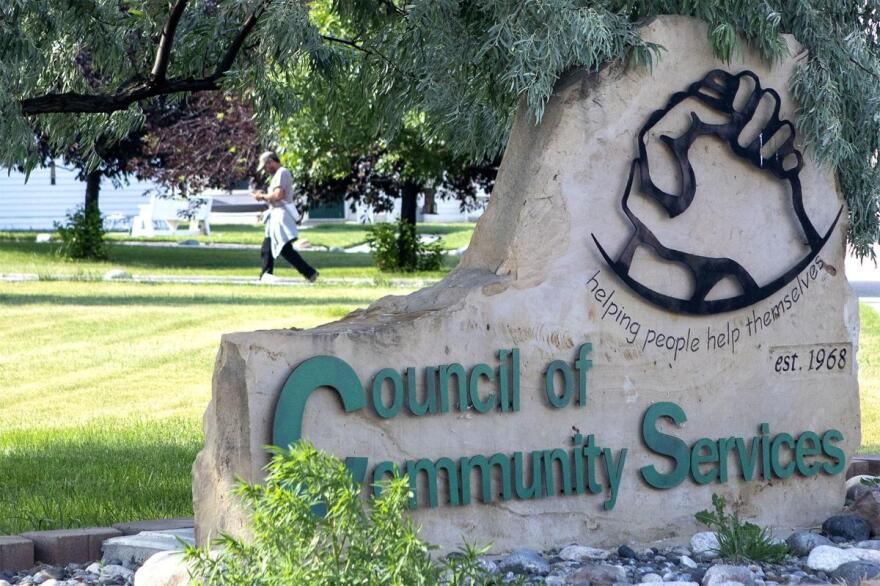The Council of Community Services in Gillette provides a lot of critical services to the community. It focuses on homelessness and poverty, like running a food pantry and the city's only homeless shelter.
Mikel Scott, the council's executive director, said for years, its building has been falling apart.
"The flooring of the shelter was so old that I honestly laid just a big thick piece of plywood down under the washing machine because the flooring was like bowing into the basement," she said.
So back in late 2019, when the city gave them $250,000 to cover some upgrades, they were excited. But then the COVID-19 pandemic started hitting the community and the people they serve hard. The council went ahead and allocated $50,000 of that money to be used to keep people in their homes.
"That's the right thing to do. And it prevents a lot of trauma and it would keep people out of our homeless shelter and in their homes," said Scott.

But they only used about $12,000 before federal aid finally came, which the council is continuing to receive but Scott said it goes right out the door to programs and the people they serve. Plus, during the pandemic, she said the community brought in tons of donations from monetary to basic items like bottled water.
"Before that [the pandemic], we didn't have that [many] people donating," Scott said. "We've got great donors but we didn't have what we had this past year."
Nonprofits all over the state have been affected by the pandemic in different ways. While some like the Council of Community Services were seeing massive increases in need for some programs, others were forced to pause and adapt to entirely new ways of providing services.
In Gillette, the AVA Community Art Center couldn't hold classes or events and people couldn't walk in off the streets to see or buy art. But AVA Director Quinn Goldhammer said their small staff got to stay in the office and figure out a way to still help, like making to-go kits for one of their youth art programs so those classes could continue.
"I think that really is our mission with AVA is that we truly do believe the visual arts enrich lives. And I think there was never a time more relevant in my life than last year to bring that into the community in kind of whatever way we could," she said.
But for Terri Watson, the president of the National Outdoor Leadership School (NOLS) it was a different experience. NOLS is based in Lander and runs outdoor education and leadership programs across the world.
She said lockdowns all over the world caused them to shut down their programs. But NOLS was too small but too big to qualify for various federal aid programs.

"We laid off about 60 percent of our headquarter staff, about 85 percent of our programmatic staff and 100 percent of our seasonal work agreement and instructional staff. And that was really pretty devastating," Watson said.
But they got to work re-imagining how their programs could work. They're slowly recovering, starting up programs and hiring more people back, especially since how many people have been getting outdoors in the last year.
"Pre-pandemic, we believed that our mission had values to the individuals who take our courses. But the pandemic spotlighted, in great relief for us, that now more than ever, being able to go on a NOLS course or taking those wilderness medicine courses can be truly transformative and life-changing," Watsonsaid.
Now, all these nonprofits are looking to the future and wondering what's next.
Watson said she's already seeing more interest in NOLS programs. Businesses are expected to be able to pick right back up to meet the need, but it's not that easy.
"I think that it's going to be devastating to small companies," she said. "But I think as an industry, and in terms of demand and need, we're going to see a greater desire and a greater investment in people's time and attention in outdoor recreation and outdoor education. We're seeing it now."

Mikel Scott, with the Council of Community Services in Gillette, said her employees have taken on bigger workloads because of the increase in need. But the aid and donations they receive can't go to salaries.
"It's difficult, I'm sure, anywhere in Wyoming and I know at least in Campbell County, to find people that will work positions because they're not hugely, highly paid positions, and they are difficult, and there's a lot of burnout," she said. "So when you find good people that are good at their job, and like what they do, you really don't want to lose them."
On top of that, Scott said she's worried about how an increase in need will pair with less government support.
"I'm terrified that not only the city and the county might forget, but also the whole community," she said. "When it's on the news all the time, and they're looking at long lines of people in Dallas lining up for a food pantry, they think, 'Oh, I need to donate.' But I worry that we'll go back to doing what we've been doing, and doing more and getting less."
Scott said state and local cuts are already on the way. And while the rules around the federal aid are strict, the council is able to make some improvements to their shelter with the CARES funding they did receive.








